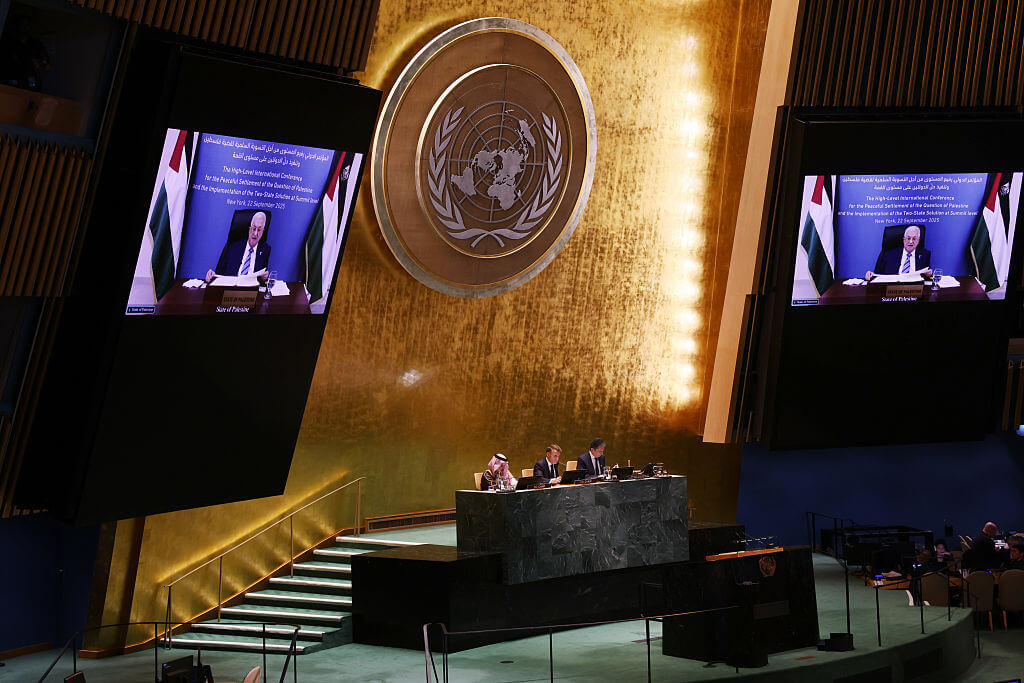142 countries have voted for a path to Israeli-Palestinian peace, why are these 10 countries opposed?
A curious mix of Pacific Island nations and other countries oppose a two-state solution

Palestinian Authority president Mahmoud Abbas speaks over a video link at a United Nations (UN) General Assembly meeting being organized by France and Saudi Arabia in support of a two-state solution between Palestine and Israel in New York City. Photo by Spencer Platt/Getty Images
As world leaders convene in New York today to rally support for a two-state solution, an increasing number of countries have formally recognized a Palestinian state, most recently the United Kingdom, Australia and Canada.
But what may seem like an unusual mix of countries is unlikely to budge in favor of Palestinian statehood: Israel, the U.S., Argentina, Hungary, Micronesia, Nauru, Palau, Papua New Guinea, Paraguay, and Tonga.
These 10 countries all voted against a declaration earlier this month that called for a permanent ceasefire, the release of all hostages, and Israel to commit to a two-state solution. The resolution, which 142 countries voted for, also condemned the Oct. 7 attack on Israel by Hamas in 2023 and called for an end to Hamas’ rule in Gaza.
Israeli Prime Minister Benjamin Netanyahu recently declared “there will be no Palestinian state” and has said leaders who recognize Palestinian statehood are “rewarding terror with an enormous prize.” U.S. Secretary of State Marco Rubio said any move to recognize a Palestinian state would only make Hamas “feel more emboldened.”
But why does this list of smaller countries, with less obvious connections to the region, oppose a two-state solution?
Pacific Island nations
Micronesia and Nauru have no Jewish population at all, while Palau and Tonga each likely have fewer than 10. Yet these tiny Pacific island nations are among Israel’s most consistent supporters.
Their backing appears to be driven by a mix of religious conviction and economic ties. Christianity is dominant across these islands, and Christian Zionism — the belief that the modern state of Israel fulfills a biblical prophecy — has gained influence there.
Economic factors play a role, too. Both the U.S. and Israel provide significant aid to many of these nations. Micronesia and Palau are part of the Compact of Free Association (COFA), an agreement that ensures the U.S. supplies financial assistance and security guarantees in exchange for exclusive military access to strategic parts of the Pacific.
That relationship has geopolitical consequences: President Trump has in the past threatened to cut off aid to countries that vote against Israel at the United Nations — a pressure point likely to resonate in small nations reliant on U.S. support.
Nearby Papua New Guinea also depends heavily on foreign aid, and just this week the U.S. State Department announced expanded economic and security partnerships with the country. Papua New Guinea has similarly backed Israel in major U.N. votes.
Argentina and Paraguay
Once a refuge for Nazis in hiding, Argentina has long been home to the largest Jewish community in Latin America, with its Jewish population peaking in the early 1960s.
Its relationship with Israel has also shifted: In 2010, under a center-left government, Argentina recognized Palestinian statehood. But the country’s current right-wing president, Javier Milei, elected in 2023, has shifted course, making support for Israel a cornerstone of his foreign policy.
Milei has pledged to move Argentina’s embassy from Tel Aviv to Jerusalem by 2026, and in 2025 he became the first non-Jewish recipient of the Genesis Prize, often referred to as “the Jewish Nobel Prize.”
Similarly, Paraguayan President Santiago Peñat has moved Paraguay’s Israeli embassy to Jerusalem and designated Hamas and Hezbollah as terrorist organizations. In April, the American Jewish Committee granted him an award “for bolstering his nation’s enduring friendship with the Jewish people and Israel.”
For both leaders, support for Israel may be a way to strengthen their countries’ strategic ties with the U.S., including securing favorable tariff agreements and attracting U.S. investments. Milei is set to meet with Trump and Netanyahu this week in New York.
Shared security concerns may also help explain the alignment. The region where Argentina, Brazil, and Paraguay meet, known as the Tri-Border Area, is a central hub for Hezbollah’s illicit activities in Latin America. Both countries cooperate with Israel and share intelligence on counterterrorism.
Hungary
Hungary has one of the largest Jewish populations in Central Europe, and Prime Minister Viktor Orbán claims to maintain a “zero tolerance” policy on antisemitism — even as he has also invoked antisemitic tropes about Jewish philanthropist George Soros and praised Miklos Horthy, a Nazi-allied World War II leader.
Orbán has opposed a two-state solution and warned against increasing the number of Muslim voters relative to Jewish voters in Israel, telling Hungarian Conservative magazine, “That’s just how the math works — that’s democracy — and then the Jews will have to pack up and leave.”
A close ally of both Netanyahu and President Trump, Orbán’s support for Israel appears rooted in a strategic alignment with the political right. The three leaders share positions on issues such as strict border security, opposition to mass migration, and skepticism of international institutions.
When the International Criminal Court issued an arrest warrant for Netanyahu over alleged war crimes in Gaza, Orbán declared he would defy it, withdraw from the ICC, and give Netanyahu a warm welcome on a visit to Hungary. Netanyahu has described his relationship with Orbán as an “unparalleled” friendship.
What’s next
About 10 countries, including France and Belgium, are expected to formally recognize a Palestinian state later today at the United Nations summit. The recognition will be largely symbolic, with Israel showing no signs of slowing down as it continues its attacks on Gaza and expansion of West Bank settlements. Netanyahu is slated to speak at the summit on Friday, days after sending a defiant message to leaders recognizing a Palestinian state: “We have doubled the Jewish settlement in Judea and Samaria, and we will continue on this path.”















